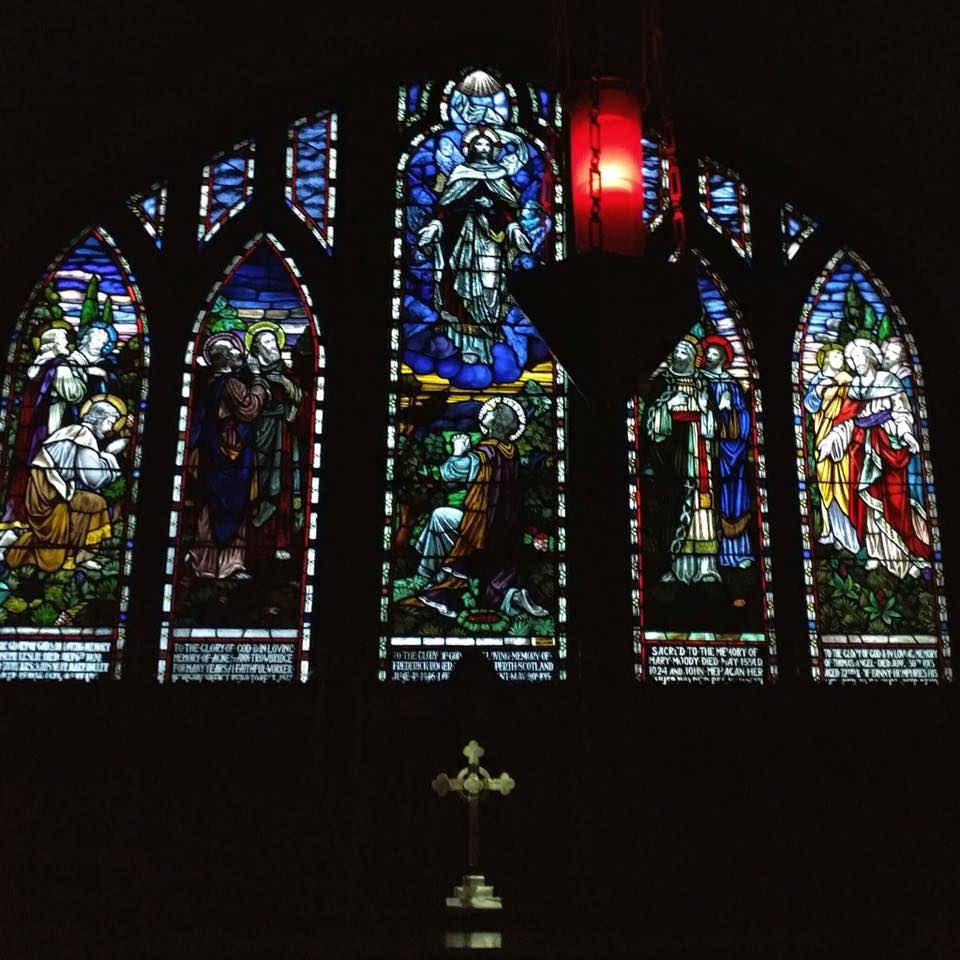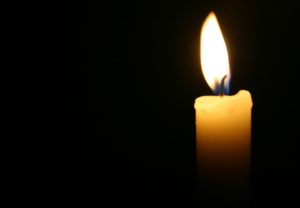Service of Remembrance for All Souls’

EvOn Monday, November 4 at 7pm, come to Ascension for a meditative service to remember those who have died, and seek God’s comfort as we mourn. Bring photos of those you wish to remember.

EvOn Monday, November 4 at 7pm, come to Ascension for a meditative service to remember those who have died, and seek God’s comfort as we mourn. Bring photos of those you wish to remember.
the parable of the ten lepers and gratitude for creation
Luke 17:11-19
The Rev’d Rhonda Waters

On the way to Jerusalem Jesus was going through the region between Samaria and Galilee. As he entered a village, ten lepers approached him. Keeping their distance, they called out, saying, “Jesus, Master, have mercy on us!” When he saw them, he said to them, “Go and show yourselves to the priests.” And as they went, they were made clean. Then one of them, when he saw that he was healed, turned back, praising God with a loud voice. He prostrated himself at Jesus’ feet and thanked him. And he was a Samaritan. Then Jesus asked, “Were not ten made clean? But the other nine, where are they? Was none of them found to return and give praise to God except this foreigner?” Then he said to him, “Get up and go on your way; your faith has made you well.”

Prostrating yourself (lying face down on the ground) is not something we do very often. It’s a very dramatic gesture which takes some effort to execute and leaves us very vulnerable and pretty uncomfortable. It signifies an intensity of emotion and a complete self-giving, whether in service or in gratitude or in despair. In this week’s Gospel, the healed Samaritan prostrates himself before Jesus as an act of radical gratitude.
Prostration is sometimes used liturgically. In some diocese, ordinands prostrate themselves during the prayers that come right before they are ordained. In some churches, the clergy prostrate themselves at the beginning of the Good Friday service during a time of silent prayer.
I don’t think we are going to introduce prostration into our liturgy at Ascension but you could try it out during a time of private prayer (or have your kids try it out while you say a prayer of thanksgiving and/or dedication). It will probably feel silly at first but hold on for a little and see what happens. What other feelings rise within you? What does the prayer become?
Sometimes, we don’t say thank you because we don’t notice the gifts we have been given. Spend some time this week taking stock of where you have experienced healing or growth. Say thank you to the people who have contributed to that gift. Say thank you to God (maybe while lying prostrate…)

This is a familiar refrain in the Gospel healing stories but, in this story, it comes after the healing has been received which suggests that the wellness that has come through faith is about more than the physical healing.
In what ways has your faith made you well?
Imagine how the lepers felt when they saw Jesus coming into their village. They had obviously heard of him and knew he had a reputation as a powerful healer. I wonder if they were sceptical or hopeful or nervous or…
And how did they feel when all he did was tell them to go and show themselves to the priest. And when they realized that they were healed?
What do you think the 9 lepers who did not return to Jesus did?

The Jewish Encyclopaedia offers a long but skimmable article on the history of the Samaritan people and their relationship with the Jews.
And CNN has a short and fascinating article on the very tiny modern Samaritan community that continues to live in Israel and Palestine today.

Holy God, we do not always understand your word or your ways.
Give us wisdom and imagination and courage as we learn and grow.
The story this week has made me wonder about…
(what questions are still on your heart?)
Receive my questions and help me hear your answers.
The story this week has filled me with…
(how are you feeling?)
Accept my praise, heal my hurt, ease my worry.
The story this week has reminded me of…
(are there situations or people you are thinking of?)
Be with all who are in need of you.
In Jesus’ name, we pray.
Amen.

The apostles said to the Lord, “Increase our faith!” The Lord replied, “If you had faith the size of a mustard seed, you could say to this mulberry tree, ‘Be uprooted and planted in the sea,’ and it would obey you. Who among you would say to your slave who has just come in from plowing or tending sheep in the field, ‘Come here at once and take your place at the table’? Would you not rather say to him, ‘Prepare supper for me, put on your apron and serve me while I eat and drink; later you may eat and drink’? Do you thank the slave for doing what was commanded? So you also, when you have done all that you were ordered to do, say, ‘We are worthless slaves; we have done only what we ought to have done!’”

The grocery store can help us out with this question. Stop by the spice aisle this week and take a look at the real thing.
I bet your faith is at least that big. Imagine the things you can do!
How often do we want praise for doing what we are supposed to do? How often do we want to make what we are supposed to do into something more complicated or mysterious than it really is?
As our observation of the Season of Creation draws to a close, make a list of things you ought to do in order to care for the world God made. Now do them.
Might it actually be that simple?

The Feast of St. Francis is on October 4th so we are going to remember his example of fearless faithfulness this Sunday. Francis heard God calling him to a new way of life that connected him deeply to creation, to people who were poor and vulnerable, and to worship…and Francis responded with a kind of wild abandon that continues to inspire us.
What do you think that kind of response feels like?
How does imagining it make you feel?
Exhilarated? Scared? Ashamed? Eager?
Can you think of other people who model this fearless faithfulness?
What do their lives look like?
What would your life look like if you embraced this kind of fearless faithfulness?
Jesus seems to be rambling a little in this passage – what’s the connection between the mustard seed of faith and the slaves who just do what they ought to do and expect no thanks?
I think it might be “Just do it”. The disciples ask for Jesus to increase their faith and he seems to be telling them they have all the faith they need – since all they need is faith the size of a mustard seed. Then he wonders why they expect to be served by the one whom they are supposed to be serving instead of just getting on with what they need to do.
They have the faith they need. They have the job they need. They just need to do it.
What do you need to do?

The Indigenous teaching of “all my relations” is the insight that all life is related to all life – and not only in a technical or mechanistic way. All of creation is connected like a family is connected. The same life force flows through all. The same love flows through all. We are all related. This insight is revealed in the language often used by Indigenous elders and teachers, naming rocks and waters and sun and moon as grandmothers and grandfathers, aunties and uncles, brothers and sisters
This teaching is not foreign to western Christian thought – although it has often been ignored or diminished. St. Francis wrote a hymn that celebrates the great family to which we belong in creation.
The Canticle of the Sun was written around 1224, in an Italian dialect, and is thought to be among the first (and maybe the very first) work of literature to be written in Italian.
Here it is in an English translation
Most High, all powerful, good Lord,
Yours are the praises, the glory, the honour,
and all blessing.
To You alone, Most High, do they belong,
and no man is worthy to mention Your name.
Be praised, my Lord, through all your creatures,
especially through my lord Brother Sun,
who brings the day; and you give light through him.
And he is beautiful and radiant in all his splendour!
Of you, Most High, he bears the likeness.
Praised be You, my Lord, through Sister Moon
and the stars, in heaven you formed them
clear and precious and beautiful.
Praised be You, my Lord, through Brother Wind,
and through the air, cloudy and serene,
and every kind of weather through which
You give sustenance to Your creatures.
Praised be You, my Lord, through Sister Water,
which is very useful and humble and precious and chaste.
Praised be You, my Lord, through Brother Fire,
through whom you light the night and he is beautiful
and playful and robust and strong.
Praised be You, my Lord, through Sister Mother Earth,
who sustains us and governs us and who produces
varied fruits with coloured flowers and herbs.
Praised be You, my Lord,
through those who give pardon for Your love,
and bear infirmity and tribulation.
Blessed are those who endure in peace
for by You, Most High, they shall be crowned.
Praised be You, my Lord,
through our Sister Bodily Death,
from whom no living man can escape.
Woe to those who die in mortal sin.
Blessed are those whom death will
find in Your most holy will,
for the second death shall do them no harm.
Praise and bless my Lord,
and give Him thanks
and serve Him with great humility.[3]

Holy God, we do not always understand your word or your ways.
Give us wisdom and imagination and courage as we learn and grow.
The story this week has made me wonder about…
(what questions are still on your heart?)
Receive my questions and help me hear your answers.
The story this week has filled me with…
(how are you feeling?)
Accept my praise, heal my hurt, ease my worry.
The story this week has reminded me of…
(are there situations or people you are thinking of?)
Be with all who are in need of you.
In Jesus’ name, we pray.
Amen.
Church of the Ascension is a parish of the Anglican Diocese of Ottawa,
and the Anglican Church of Canada.
We stand on the traditional and unceded territory of the Algonquin Anishnabe nation.